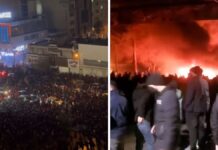X: @the_news_21
Russia and China wielded their veto power on Friday to block a US-led draft resolution at the United Nations Security Council calling for a ceasefire in Gaza. The resolution, proposed by the United States, aimed to endorse “the imperative of an immediate and sustained ceasefire” and condemn Hamas for its October 7 attack.
Despite receiving support from the majority of Security Council members, including permanent members France and Britain, the resolution was blocked by Russia and China, with Algeria voting against and Guyana abstaining.
Russian Ambassador Vasily Nebenzia criticized the US for what he termed a “hypocritical spectacle,” accusing Washington of failing to pressure Israel while Gaza suffers. Nebenzia derided the resolution as overly politicized and aimed at appeasing voters rather than addressing the root causes of the conflict.
He argued that the resolution would only serve to shield Israel from accountability for its actions in Gaza, where he claimed significant devastation has occurred.
The draft resolution linked a ceasefire to ongoing negotiations facilitated by Qatar, the United States, and Egypt, with the goal of securing the release of hostages held by Hamas.
US Ambassador Linda Thomas-Greenfield condemned the Russian and Chinese vetoes as both cynical and petty. She accused the two countries of obstructing the resolution simply because it was authored by the United States, asserting that they were not actively engaged in diplomatic efforts to achieve lasting peace or provide humanitarian assistance.
The deadlock at the Security Council underscores the deep divisions among member states regarding the Israeli-Palestinian conflict and the challenges of achieving consensus on addressing the ongoing violence and humanitarian crisis in Gaza.
While the US-led resolution aimed to bring an end to hostilities and address humanitarian concerns, the opposing viewpoints represented by Russia and China highlight the complexities of international diplomacy and the divergent interests at play in the Middle East.







can i get cheap clomid can you get generic clomiphene for sale can i order clomid without rx can i order cheap clomid online how to buy clomid where can i buy cheap clomiphene no prescription order generic clomiphene online
This website positively has all of the low-down and facts I needed adjacent to this subject and didn’t identify who to ask.
Palatable blog you have here.. It’s intricate to on high status script like yours these days. I honestly recognize individuals like you! Take care!!
brand azithromycin – tindamax without prescription metronidazole ca
rybelsus oral – purchase semaglutide pills cyproheptadine without prescription
motilium 10mg price – tetracycline price cheap cyclobenzaprine 15mg
buy augmentin generic – https://atbioinfo.com/ ampicillin online order
nexium drug – https://anexamate.com/ esomeprazole 20mg usa
warfarin 5mg drug – https://coumamide.com/ hyzaar pill
buy mobic 15mg online – https://moboxsin.com/ buy meloxicam
buy fluconazole 200mg online – https://gpdifluca.com/ buy diflucan 200mg pill
cialis trial – cialis tablets for sell cialis brand no prescription 365
cialis sublingual – tadalafil 5mg once a day cialis male enhancement
buy ranitidine paypal – https://aranitidine.com/# order zantac pills
can you buy viagra cvs – site buy cheap viagra uk online
I couldn’t turn down commenting. Warmly written! https://gnolvade.com/
With thanks. Loads of erudition! https://buyfastonl.com/gabapentin.html
This is the gentle of writing I in fact appreciate. https://prohnrg.com/product/rosuvastatin-for-sale/
I am actually happy to glance at this blog posts which consists of tons of worthwhile facts, thanks for providing such data. https://aranitidine.com/fr/acheter-fildena/
This is the amicable of glad I get high on reading. https://ondactone.com/simvastatin/
Greetings! Extremely gainful recommendation within this article! It’s the crumb changes which will espy the largest changes. Thanks a quantity towards sharing!
https://proisotrepl.com/product/propranolol/
More articles like this would pretence of the blogosphere richer. http://iawbs.com/home.php?mod=space&uid=915039
xenical canada – order orlistat xenical 120mg over the counter
Thanks for putting this up. It’s well done. http://www.01.com.hk/member.php?Action=viewprofile&username=Vfjkca
Greetings! Extremely serviceable par‘nesis within this article! It’s the petty changes which will espy the largest changes. Thanks a quantity in the direction of sharing! TerbinaPharmacy
More peace pieces like this would make the web better.
Khám phá thế giới giải trí trực tuyến đỉnh cao tại MM88, nơi mang đến những trải nghiệm cá cược thể thao và casino sống động.
iwin – nền tảng game bài đổi thưởng uy tín, nơi bạn có thể thử vận may và tận hưởng nhiều tựa game hấp
Khám phá thế giới giải trí trực tuyến đỉnh cao tại MM88, nơi mang đến những trải nghiệm cá cược thể thao và casino sống động.
利用强大的谷歌蜘蛛池技术,大幅提升网站收录效率与页面抓取频率。谷歌蜘蛛池
Tham gia cộng đồng game thủ tại Go88 để trải nghiệm các trò chơi bài, poker phổ biến nhất hiện nay.
Với giao diện mượt mà và ưu đãi hấp dẫn, MM88 là lựa chọn lý tưởng cho các tín đồ giải trí trực tuyến.
kuwin sở hữu kho game đa dạng từ slot đến trò chơi bài đổi thưởng, mang đến cho bạn những giây phút giải trí tuyệt vời.